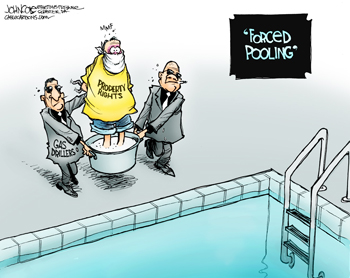SB 576, this year’s revised version of forced pooling, is unlikely to pass.
The reason it isn’t likely to pass is that the House is running out of time to pass legislation and the House hasn’t spent any time on the forced pooling legislation. This sounds like bad planning on the sponsor’s part, but actually the House spent a huge amount of time debating some legislation about medical marijuana–lots more than was expected. (It looks like that is going to pass, if you’re interested.)
There’s a small possibility that someone could push for this bill on the last day or two of the session so we can’t say it’s completely dead yet. It’s on life support, though.
We’re glad this forced pooling legislation won’t pass. It was not really well written and it gave a lot of power to the companies. Last year’s legislation was probably a tiny bit better, actually. At very least it was a better written piece of legislation.
One of these years the companies are going to realize that getting forced pooling passed is really hard.
One of these years the companies are going to realize that they need to address one or two issues instead of trying to push legislation that addresses every single issue they want to address.
This year wasn’t that year.




